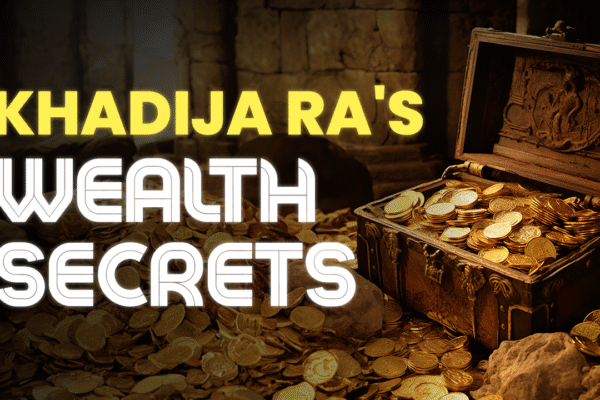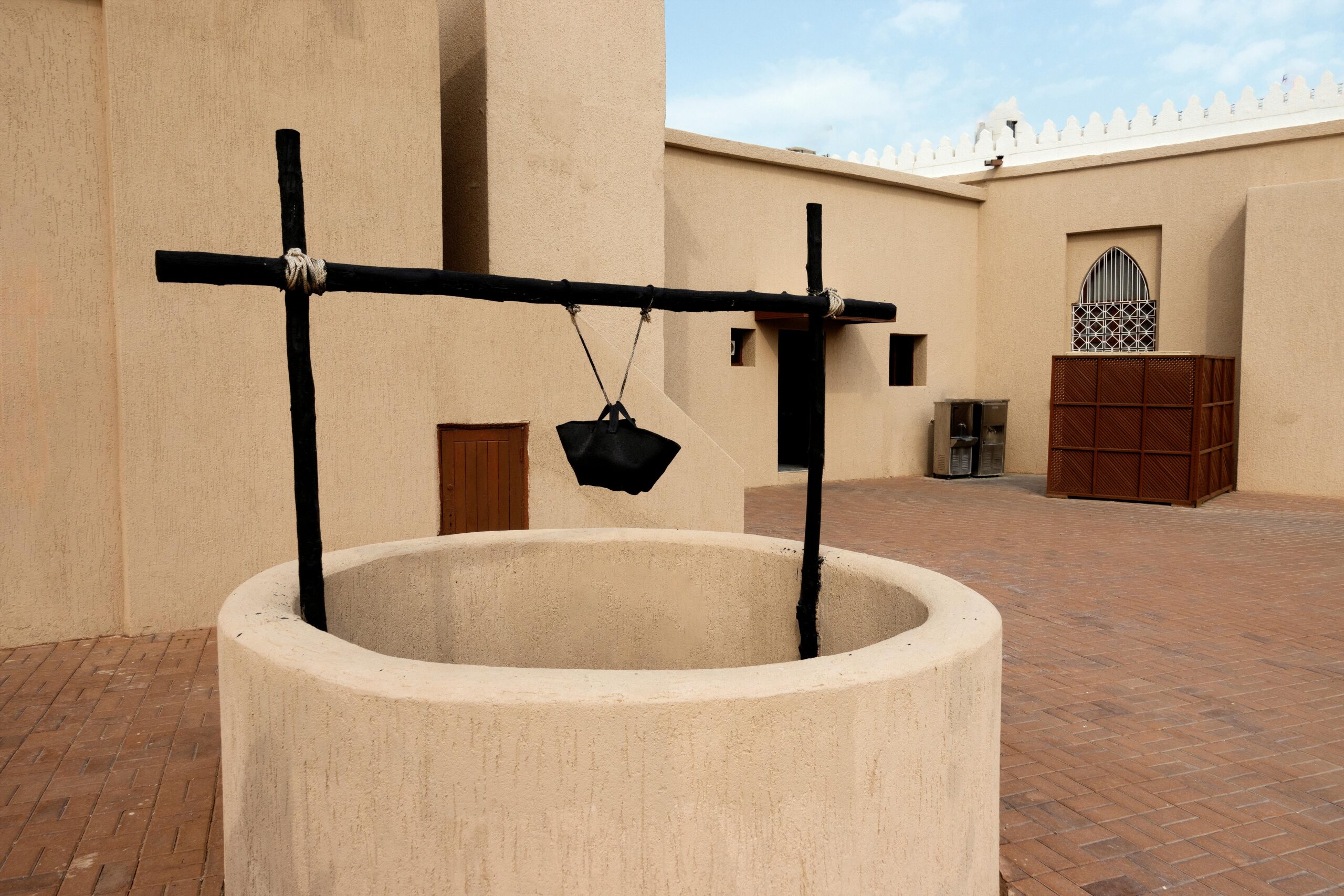
6 Wealth-Building Lessons from Khadijah (RA) Every Muslim Should Know
03 December 2025 8 min read


Ibrahim Khan
Co-founder
12 min read
Last updated on:
Uthman Ibn Affan (RA) is famously remembered as one of the richest and most generous companions of the Prophet Muhammad (PBUH). But while everyone knows about his legendary charity giving, very few people actually understand the hidden business secrets behind how he actually amassed this enormous wealth in the first place.
So we’ve gone away and deeply researched authentic early sources like Tabaqaat Ibn Saad, Ibn Kathir’s Al-Bidaya wa l-Nihaya, and Ibn Asakir’s Tarikh Dimashq, and we’ve uncovered fascinating and little-known insights that build this picture of how Uthman (RA)’s wealth strategies actually work.
These aren’t your typical business advice and of the seven secrets that we’re going to be mentioning, my favourite is the very last one we share in this article.
Imagine one person single-handedly funding an entire army or personally funding the water supply for an entire community, Allah huma barik. So let’s dive into Uthman (RA)’s seven business secrets to extreme wealth.
If you’d rather watch than read, you can view our video here.
Uthman ibn Affan (RA) was the third Caliph of Islam, serving from 644 to 656 CE, and one of the ten companions promised Paradise by the Prophet Muhammad ﷺ.
Born into the wealthy and respected Umayyad clan of Quraysh in Makkah, he accepted Islam early through the call of Abu Bakr (RA) and became known for his generosity, modesty, and piety.
A lot of people don’t realise that Uthman (RA) was actually born into a wealthy family. But that by itself doesn’t explain his personal financial success.
His father, Affan ibn Abdi al-As, was a well-known merchant, and his family had substantial trade connections, all of which provided Uthman (RA) with a solid foundation to start his business ventures.
But Uthman didn’t just sit on his own laurels. He leveraged this unfair advantage which by the way everyone has – we just need to identify it. Uthman (RA) made use of this advantage and worked hard to improve his business network even further.
Uthman developed relationships with merchants and traders not only in Makkah but also in Syria, Egypt, and Persia, and that allowed him to control a substantial portion of the trade routes and goods flowing in and out of the Arabian Peninsula.
During his early career, Uthman had a significant trading relationship with Byzantine traders in Syria. It’s reported that Othman was involved in the import and export of high-value goods like spices, silk, precious metals, and perfume, which were highly sought after in both the Arabian Peninsula and the Byzantine Empire.
And so this is actually another benefit we can get from Uthman (RA), his strategy of focusing on high-value items, because typically there’s a lot more margin there and typically because demand there is very inelastic (consistent demand regardless of changes in price), people are much more willing to pay a higher price for things that are seen as premium.
After all of this success, Uthman (RA) had to actually deal with a significant personal setback as well. And he had to rely on his interpersonal skills and once again rebuild everything from the ground up after his migration to Madinah when Muslims were being persecuted in Makkah. Again, his networking skills allowed him to establish a stellar reputation in the new market and economy of Medina.
So for those people who are seeking to build wealth, don’t avoid networking as something cringeworthy or an unnecessary obstacle or problem. Rather, we should see it like Uthman (RA), who understood that building a reputation and building a network is something as fundamental to the success of his business as the trade itself.
The Prophet (PBUH) famously said that Uthman (RA) is the most modest of the companions of the Prophet, and he is the one who is the most trusted by the Muslims as well [Sahih Muslim 2402a]. So you can see this quality was something that was deep in Uthman (RA), and the Prophet noted that as well.
Now, all of us already know about Uthman (RA)’s generosity, and it’s the stuff of legend. But Uthman (RA) didn’t give charity haphazardly to orphans and the needy like many of us sometimes might do today. His charity was strategic and purposeful.
Uthman (RA)’s most famous contribution came during the Battle of Tabuk when the Prophet (PBUH) called on the companions to contribute to the army of Tabuk.
The Prophet (PBUH) said to the companions, “Who will provide for the army of Tabuk?” And this was when the Muslim army was facing a severe shortage of resources and required urgent financial support to cover the costs of the military expedition to the north, where the Byzantine Roman Empire posed a significant threat.
Uthman (RA) responded by bringing 100 camels the first time. Then the Prophet asked again, and he brought another 100 camels. Then the prophet asked again, and he brought another 100 camels totaling 300 camels.
And when the Prophet (PBUH) called once more for donations, Uthman stepped forward a final time. And this time, Uthman (RA) contributed more than he had before. He donated 1,000 camels, 1,000 horses, and 1,000 ounces of gold.
And this is a time when you had the crops just about to be harvested, and in an agrarian society like Madinah, that is basically the time when you’re going to be able to cash in on all of the crops and all of the money and be able to sell it and be able to make that money. And so Uthman (RA) was giving away all of his wealth at that critical moment when he would most need it.
So this is the context, and after seeing this sacrifice, the Prophet (PBUH) praised Uthman (RA), and he declared:
“What Uthman does after this will not harm him” [Jami` at-Tirmidhi 3701]
In other words, he was giving him the glad tidings of Jannatul Firdous.
Uthman’s generosity was monumental. And really think about this: war is very expensive. And this is what he was donating to. And it wasn’t an act that was just about charity, like we often hear people mention. It was a strategic investment in the future of the Muslim community, which in turn strengthened Uthman (RA)’s business in the long term, although that probably was not his intention.
Like Uthman (RA), we need to stick together today and look after our community. And the way that you can all do that in one small way is by joining initiatives like this. Perhaps you subscribe to our newsletter and you share this article with others who you think will be able to really benefit from this in sha Allah and get inspired to be like Uthman Ibn Affan (RA).
We’ve talked about Tabuk, but in my humble opinion, Uthman (RA)’s most powerful investment came much earlier when he first moved to Madinah, and he purchased the well of Rumah for the Muslim community.
This was at a time of struggle for the Ummah, because when the Muslims arrived in Madinah, they faced a severe water crisis. And in a desert, water is extremely scarce and absolutely vital for life, and people were really suffering, especially during the hot summer months.
The Prophet (PBUH) said:
“Whoever gives money to buy a well of water for Muslims, will be rewarded by Allah as a great reward” [Sahih Muslim, Hadith 1373].
Uthman (RA), seeing this urgent need, purchased the well from a Jewish man for a very substantial price, one that was above the odds for what that well was worth. But it was because the community could never have afforded it otherwise. 20,000 dirhams is what he paid. A sum that represented an absolute fortune at the time.
And remember, this is at a time when Uthman (RA) has left behind the bulk of his money and he’s come over to Madinah with very little. And from that, he is spending. And again, this is at a point when he would really want to try and conserve as much of his money as he possibly could so that he’s ready to go into the market and start rebuilding it.
But that’s the point. He bought the well.
Uthman (RA) didn’t just give when it was easy. He gave when it was hard. And that’s the thing that these stories, when we hear them, we often don’t realise this. Uthman (RA) didn’t just buy this well. He also made it available for the public free of charge.
That’s like a water company in the UK giving all of its water away for free to the customers forever. This act wasn’t just a business transaction where he bought the well. It was a lifeline for the community. And for the Muslims of Medina who had struggled to find clean water until this point, they were now able to access water whenever they needed it.
And by doing so, this investment not only secured Uthman (RA)’s legacy in history, but it also demonstrated his ability to see long-term charitable investments. And that has an effect because he did the same thing in his business. And his reputation grew with other traders as an honourable businessman with a vision not only for the wealth of himself but for the long-term welfare of the Muslim community, which included all of them.
The Prophet (PBUH) famously said:
“Uthman is a man of truth, and there is no one more trustworthy than him in business”
[Sahih Muslim, Hadith 2432].
Uthman (RA) understood the power of building and maintaining relationships. He wasn’t just a businessman. He was also a master at forming alliances. But he didn’t just form relationships and networks with the elite, like we’ve mentioned earlier in this video. He extended his influence to support the struggling members of the community as well.
And one of the most significant aspects of Uthman (RA)’s generosity was his giving of interest-free loans to support the struggling members of the Muslim community, particularly the traders of Madinah. During a time of financial difficulty, Uthman (RA) used to give interest-free loans to small traders and business people who were facing economic hardship.
Uthman (RA) gave an interest-free loan to a man from Madinah who was struggling to repay his debts. Uthman (RA) forgave the debt when the man could not repay it, and he helped him to get back on his feet, and this is narrated in Sunan al-Daraqutni [Hadith 1069].
Another notable instance was when Uthman (RA) helped the traders during a famine that hit Madinah. Due to the scarcity of food and trade goods, many traders were unable to keep their businesses running. So Uthman (RA), recognising the difficulties faced by these traders, extended a loan to them without interest, allowing them to continue trading and sustaining their livelihoods.
The story goes that Uthman (RA)’s loans were not just financial support but strategic partnerships. He gave the traders a chance to grow their businesses without the crippling burden of interest, which was a significant concern at the time.
His loans were typically repaid when the traders succeeded in the ventures, and many of them naturally chose Uthman (RA) in many of their future business dealings because of the gratitude, and sometimes they would even pay more than they had even borrowed as a sign of respect and just as a sign of their gratitude.
And if we apply this to our context, imagine supporting other businesses in your community, in your ummah, at a time when you’re worried about your own business succeeding. Unlike many of us, Uthman (RA) had a long-term mindset. He knew that traders would be strongly inclined to do business with him in the future due to him being there for them in their tough times. It’s easier said than done, and Uthman (RA) did it.
The Prophet (PBUH) emphasised diversifying one’s source of income. He said that the believer who is in a constant state of self-improvement, whether in wealth or in knowledge, is the best of believers.
Uthman RA’s wealth didn’t come from just one source alone. It was the result of his diverse investments. He invested in land and real estate across the Arabian Peninsula.
This allowed him to spread risk across multiple ventures. This diversified approach ensured that when one market suffered, Uthman (RA) was still financially stable as his wealth was coming from multiple streams.
As he traded in multiple markets, his wisdom in diversification ensured that he was able to withstand the economic fluctuations of his time. He wasn’t reliant on any one source of income, but rather he’d built a foundation through varied trade deals, a lesson that us modern-day investors would do well to follow.
So, don’t put all of your money into crypto!
The Prophet (PBUH) famously said I fear that you will be given your reward in this world instead of the hereafter predicting the wealth and the success that would come to the Muslims after his death being aware of this hadith that the Prophet (PBUH) said before he passed away and despite his immense wealth, Uthman (RA)’s humility remained a defining trait of his lifetime he was constantly fearful that his wealth might lead to arrogance which is why he kept his heart in check and always reminded himself of the temporality of this world.
He would famously weep at any time he would pass by the graves due to his heart being so soft, which is a really strong sign. He was often described as someone who didn’t indulge in extravagance or show off his riches. This humility extended to his clothing as well. He wore simple and modest clothes in line with the Prophet (PBUH)’s example. Uthman (RA)’s house was described as modest by most accounts.
Even as a khalifa, he lived simply. His personal residence was not one of lavishness or opulence. And all of this reflects on Uthman (RA)’s self-restraint and humility throughout the various stages of his life. And this was a significant part of his character. This constant self-reflection ensured that his wealth never became a source of arrogance or an issue for him. He saw himself merely as a steward of his wealth, with the ultimate responsibility being to use it for good to get himself to Jannah.
Uthman (RA)’s commitment to ethical business practices was a central part of his success.
He never engaged in exploitative or dishonest trade. Everyone reflects on the purchases of the well of Rumah, as we’ve mentioned previously. But his purchase wasn’t the only exemplary act. It was also in his management of it. He didn’t just decide to sell the water from the well, even though he could have. He made the honourable decision to make it available for the community for free without exploiting people’s desperate need for water.
This commitment to fair trade and integrity, and proper management, not only ensured his wealth but also earned him the constant respect of those around him, opening yet more doors for business opportunities for all those who wished to partner with him.
This final secret is my favourite, as literally everyone watching this video can start practising this one immediately. It’s an act of the heart rather than a physical action. Take a deep breath and reflect on everything you have to be thankful to God for. And by doing that, you’re already acting on this final secret.
Uthman (RA)’s approach to gratitude was a key factor in his sustained success. After each success, he would immediately share his blessings with others. One lesser-known story comes from a time of a massive harvest from his orchard. Instead of hoarding that wealth, Uthman (RA) immediately hosted a public feast, and he invited the poor and the needy, and he shared this abundance with the community, and he said:
“All of this is from Allah, and I share it with you all”. [Taqabat Ibn Saad]
His actions reflected his understanding of this Quranic verse:
“If you are grateful, I will surely increase your favour upon you” [Qur’an 14:7]
This constant accountability for his wealth and his giving of thanks through charity ensured that man’s wealth never became a barrier to his spiritual growth. Instead, it served as a means for him to strengthen his connection with Allah SWT.
So folks, those are the seven elixirs to actually building real long-term wealth with barakah in it from a man who is guaranteed Jannatul Firdous.
And if you enjoyed reading this, consider subscribing to our newsletter and sharing this with someone in your network who you think could use the spark of inspiration from Uthman (RA)’s entrepreneurship and his relationship with money.
If you want to learn more financial lessons from the Qur’an, you can download our free ebook containing 30 bite-sized lessons on how to manage your money in a way that pleases Allah here.
You may also be interested in reading our article on wealth secrets inspired by the life of Abdurrahman Ibn Awf (RA).
And let’s revive these timeless lessons in our day and age as well.

03 December 2025 8 min read

26 November 2025 6 min read

01 August 2025 11 min read
Leave a Reply